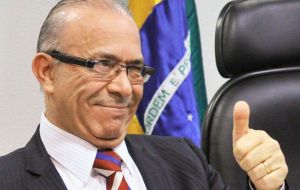MercoPress. South Atlantic News Agency
Odebrecht's state of the art Division of Structured Operations, better known as “bribe department”
 “There was a rule: Either we don’t contribute to anyone, or we contribute to everyone,” explained Emilio Odebrecht, chairman of the board
“There was a rule: Either we don’t contribute to anyone, or we contribute to everyone,” explained Emilio Odebrecht, chairman of the board  The man who is now President Michel Temer’s chief of staff, Eliseu Padilha, was called “cousin”. Ex former Rio Mayor Eduardo Paes was “little nervous one.”
The man who is now President Michel Temer’s chief of staff, Eliseu Padilha, was called “cousin”. Ex former Rio Mayor Eduardo Paes was “little nervous one.”  Others were “decrepit”,”Viagra”, ”little boy of the forest” and “Dracula”. Former president Lula da Silva was “friend” and ex president Dilma, “sauerkraut”.
Others were “decrepit”,”Viagra”, ”little boy of the forest” and “Dracula”. Former president Lula da Silva was “friend” and ex president Dilma, “sauerkraut”. The Brazilian engineering group Odebrecht kept a secret communications system to discuss and arrange the payments of bribes. A detailed spreadsheet mapped out who got what, all veiled under a system of codenames, and overseeing it all, there was an entire department at Odebrecht whose only purpose was to ensure the graft ran smoothly.
Though deals were often sealed over dinners and coffees, there was nothing casual about the massive corruption scheme that Brazilian prosecutors are investigating involving bribes and kickbacks paid to hundreds of politicians in exchange for state contracts, beneficial legislation and other favors.
The Supreme Court opened investigations into about 100 politicians this last week, based on testimony provided by current and former executives at Odebrecht. Their testimony describes how bribery and kickbacks were simply part of doing business.
“There was a rule: Either we don’t contribute to anyone, or we contribute to everyone,” explained Emilio Odebrecht, chairman of the board, referring to payments to politicians.
Odebrecht appears to have opted for the latter. Court documents released this week and prosecutors’ statements offer a peek into the highly organized way the company managed millions of dollars in bribes.
The scheme was overseen by the blandly named Division of Structured Operations, which investigators refer to as simply “the bribe department.” It had its own hierarchy and its own accountants. It also used its own off-the-books communications system, called Drousys, to communicate about the bribes both internally and externally.
The payments were detailed in spreadsheets, held in the Drousys system, according to testimony and the judge’s decision released this week. On those spreadsheets, politicians who received bribes and the intermediaries who delivered them were referred to by nicknames.
The man who is now President Michel Temer’s chief of staff, Eliseu Padilha, was called “cousin”. Former Rio de Janeiro Mayor Eduardo Paes was “little nervous one.” Others were “decrepit”, ”Viagra”, ”little boy of the forest” and “Dracula”. Former president Lula da Silva was “friend” and ex president Dilma, “sauerkraut”.
One congressman even protested on his Facebook page when his nickname — “totally ugly” — was reported in the Brazilian press last year.
The employees at Odebrecht may have had some fun with the nicknames, but their revelations so far show that they took corruption very seriously.
Prosecutors are investigating the testimony and deciding whether to bring charges. The politicians have denied wrongdoing, with many saying the funds they received from Odebrecht were legal campaign contributions.




Top Comments
Disclaimer & comment rules-

-

-

Read all commentsOn one hand, this is the “Organized Crime” at its BEST while on the other hand; the investigations/operations is a big FARCE; as long as the crooks have a “Special Privileged Protection”: HENCE;
Apr 18th, 2017 - 12:12 pm +1- MANY will not even be imprisoned/investigated
- IF imprisoned; they'll enjoy a Five-Star Treatment
- A majority will escape with ALMOST all of their loot.
- They'll change laws/constitution for their own benefits
- Their stealing will get more difficult to prove
- Their offshore accounts/foundations will get fatter
- Obviously, they will remain “Politically Active”
- If at all they are replaced; another set of crooks will take their places.
In principle, DO NOT expect DRASTIC improvements!
Similarly to what occurred in Argentina, Temer and friends took power by denouncing corruption--and when the fan began to turn, the manure began sticking to many more than intended--including Temer and friends. Poetic justice if there ever was one.
Apr 17th, 2017 - 07:23 pm 0Enrique, I think this is a positive thing. I love fans that blow manure. I hope they get to the end of the rabbit hole. Either in Brazil or Argentina. “Caiga quien caiga”!
Apr 17th, 2017 - 07:47 pm 0Commenting for this story is now closed.
If you have a Facebook account, become a fan and comment on our Facebook Page!